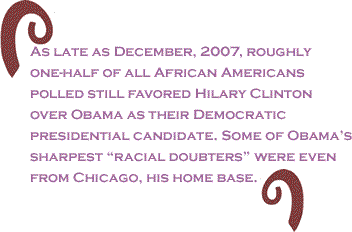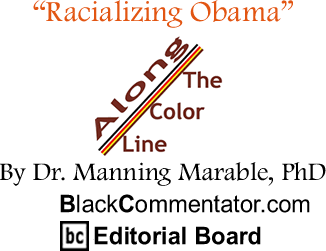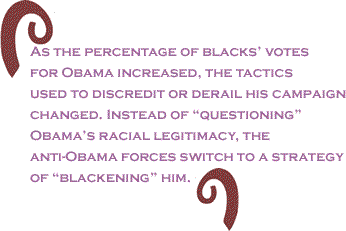
|
||||||||||||||||||||||
 |
||||||||||||||||||||||
 |
||||||||||||||||||||||
 |
||||||||||||||||||||||
 |
| The current issue is always free to everyone |
|
|
 |
From the beginning of Barack Obama’s quest for the Democratic presidential nomination, there were African-American critics who accused him of not being “black enough.” Ironically, some of those questioning his ethnic credentials were neoconservatives, or apologists for the Republican Right Wing. For example, conservative writer Debra Dickerson, author of The End of Blackness declared in January, 2007, that “Obama would be the great black hope in the next presidential race, if he were actually black.” Journalist Stanley Crouch took a similarly negative approach, stating that while Obama “has experienced some light versions of typical racial stereotypes, he cannot claim those problems as his own – nor has he lived the life of a black American.” Juan Williams, of FOX News, warned that “there are widespread questions whether this son of a white American mother and a black Kenyan father really understands the black American experience.” Even Al Sharpton challenged Obama’s legitimacy, stating, “Just because you are our color doesn’t make you our kind … It’s not about his genealogy, it’s about his policies … What is it that you’re going to represent?” As late as December, 2007, roughly one-half of all African Americans polled still favored Hilary Clinton over Obama as their Democratic presidential candidate. Some of Obama’s sharpest “racial doubters” were even from Chicago, his home base. Eddie Read, chair of Chicago’s Black Independent Political Organization, for example, predicted that “nothing’s going to happen” from the Democratic Senator’s candidacy, because “he doesn’t belong to us. He would not be the black president. He would be the multicultural president.” Such criticisms were based, in part, on the Obama campaign’s initial presentation of its candidate as both “nonracial” and “multicultural.” Obama’s diverse family and kin network are a multicultural collage of divergent ethnicities traditions and languages. For months, the Obama campaign deliberately downplayed discussions about “race.” Even their young campaign workers and volunteers have chanted, “Race doesn’t matter!” as their rejoinder to critics. Obama and black Democratic politicians like Corey Booker, Newark, New Jersey’s mayor; Massachusetts Governor Duval Patrick, and former Tennessee Congressman Harold Ford, represented themselves as a “post-black, colorblind” political elite who are now attempting to come to power, supplanting both the traditional civil rights/social activism style leadership of Jesse Jackson and Al Sharpton, as well as the black elected officials who owed their easy re-elections to the existence of majority minority legislative districts.
As the Democratic primaries progressed, however, Obama established the ability to win a significant share of whites’ votes. He consistently won majorities among all voters under 30, voters earning over $50,000 annually, and college-educated voters. After the South Carolina Democratic primary, where Bill Clinton’s race-baiting alienated thousands of voters, the African-American electorate swung decisively behind Obama. As the percentage of blacks’ votes for Obama increased, the tactics used to discredit or derail his campaign changed. Instead of “questioning” Obama’s racial legitimacy, the anti-Obama forces switch to a strategy of “blackening” him. One decisive step in “blackening up Obama” was Clinton’s controversial “3 a.m. ringing telephone” advertisement. In theory, the ad was designed as a “National Security” advertisement, designed to highlight Hillary Clinton’s superiority as a global problem-solver. But as Harvard sociologist Orlando Patterson observed, if one simply turned off the advertisement’s soundtrack, the visual images of the political commercial were almost identical with a sinister “home security ad”: Innocent children and white babies sleeping, shadows revealing a possibly intruder, the urgency of an unanswered telephone in the middle of the night. Patterson argued that to many Southern whites, all that was missing was black man in a ski mask, slipping through an open window. It would not be terribly difficult within the white American imagination to perceive Obama as a sophisticated, articulate “Willie Horton,” the black murderer whom George Herbert Walker Bush manipulated in advertisements to his electoral advantage in 1988, winning the White House. Barack, in baggy Levis and a sweatshirt, might easily be mistaken for Amadou Diallo, coming home in the Bronx, confronted with guns by the New York Police Department’s Street Crimes Unit. The next stage in “blackening Obama” came in Mississippi’s Democratic primary, where Obama easily trounced Clinton. Media pundits were quick to attribute Barack’s victory to the overwhelming mandate of Mississippi’s African-American electorate. Not surprisingly, 92 percent of Mississippi black voters had supported Obama. Obama’s white vote in Mississippi was 26 percent, a figure which frankly surprised me because it was so large. More instructive was the fact that Clinton’s greatest vote totals came from conservative Republican counties. Despite, Obama’s strenuous efforts to present a color-blind campaign, the American electorate is so indoctrinated by “race” that the Illinois Democrat was unable to escape his black identity. BlackCommentator.com
Editorial Board member, Manning Marable, PhD is one of
|
Your comments are always welcome. e-Mail
re-print notice
If you send us an e-Mail message we may publish all or part of it, unless you tell us it is not for publication. You may also request that we withhold your name. Thank you very much for your readership. |
|
| April 17, 2008 Issue 273 |
|
| Executive Editor: Bill Fletcher, Jr. |
| Publisher: Peter Gamble |
| Est. April 5, 2002 |
| Printer Friendly Version in resizeable plain text format format |
 |
 |
 |
| |
| |






























